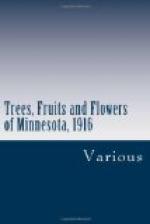I think the Snowys are also about the eastern limit of the little broad-leaved evergreen called the Oregon grape, that I believe every one in Minnesota can grow for Christmas greens. From my first acquaintance with it I got the impression that it required shade, but this time I noted that it was growing all over the bare ridges that radiate from the mountains, wherever it was possible for a little snow to lodge. We can substitute a light sprinkling of straw when snow is lacking. It certainly does not require shade.
The Mariposa lily is a unique flower that springs up in open places and produces a white blossom about the size and shape of the wild morning glory. It grows about a foot high and produces one or two flowers on each stalk. It must have a long period of bloom for ripe seed pods, and blooming plants were common at the same time in August.
The Canadian buffalo berry and a dwarfish birch are two mountain plants of no small ornamental value for the plains. They may not endure the moister air near the Mississippi, but there we have already many useful natives, like the black haw and thorn apple, that are as yet almost unnoticed.
[Illustration: Group of Douglas fir on the mountainside. Thirteen trees in a space of only two square rods. None less than two feet in diameter.]
One of the principal charms about the great country traversed by the Yellowstone Trail is its newness and freshness. Millions of acres just as the Indian, the buffalo and the coyote left them—broad stretches as far as eye can reach without a sign of human habitation. But this is fast passing away. Out among the sage brush in land as poor and desert-like as could well be imagined, homes are being mapped out by the thousand, and crops of grain were grown this year that rival the best yield in any of the older states. The time is close at hand when the main highways will be built up and made so hard and smooth that two hundred and fifty miles will be made as easily as our average runs of one hundred and fifty. The way will be safer and speedier, but it will lack some of the spice of adventure, and it will be harder to realize the simple life about the camp fire that now seems to harmonize so well with the wildness of the plains.
The Minnesota Orchard.
A QUESTION AND ANSWER EXERCISE LED BY J. P. ANDREWS,
NURSERYMAN,
FARIBAULT.




